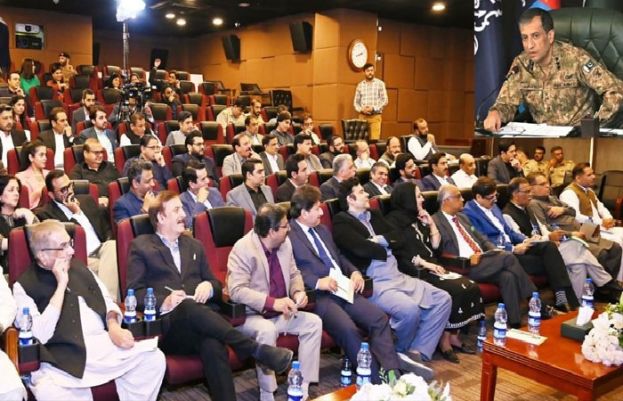Director-General Inter-Services Public Relations (ISPR) Lieutenant General Ahmed Sharif Chaudhry said on Monday that the conditions set by Afghanistan hold no significance and only the elimination of terrorism matters to Pakistan. On October 19, Pakistan and Afghanistan had agreed to an immediate ceasefire following high-level negotiations in Doha, where both countries pledged to respect each other’s sovereignty; they were expected to meet again on October 25 to discuss matters further. The second round of talks on October 25 kicked off in Istanbul, with Islamabad eyeing a “concrete” mechanism to monitor Afghan Taliban actions aimed at preventing cross-border terrorist attacks. The military’s spokesperson delivered a closed-door briefing to senior journalists belonging to select media outlets. “The conditions set by Afghanistan hold no significance,” Lt Gen Chaudhry told the journalists. “The important thing is the eradication of terrorism.” He added that the guarantors of Pakistani security are the armed forces, not Afghanistan and that Islamabad has “never celebrated” the arrival of the Taliban. The military spokesperson further said that operations are underway against banned groups, including the Tehreek-i-Taliban Pakistan (TTP) and the Balochistan Liberation Army (BLA), with 1,667 terrorists killed. “In Istanbul, the Afghan Taliban were clearly told that they need to control terrorism,” Lt Gen Chaudhry stated. “How they do it is their job. We conducted a counter-terrorism operation, and the terrorists fled to Afghanistan. Hand them over, we’ll deal with them according to the Constitution and the law. “There will be no talks with terrorists, and Pakistan gave the Afghan Taliban a befitting response, which yielded the results we wanted.” DG ISPR highlighted the role of the nexus between criminals and terrorist organisations, noting that through opium cultivation, terrorists make between Rs1.8 and 2.5 million per acre. “The entire population joins them, even warlords join in, and they all work together,” Lt Gen Chaudhry said. He added that drugs are being smuggled from Afghanistan into Pakistan and further. “Afghan drug smugglers are interfering in Afghan politics.” Senior journalist Hamid Mir, who attended the briefing, told Geo News that the journalists were presented with evidence of Afghan Taliban soldiers involved in terrorism in Pakistan. “We were presented with the same evidence shared with the Afghan Taliban in Doha,” Mir reported. “These soldiers had Afghan and Afghan Army identification cards. Border skirmishes and talks Pakistan and Afghanistan saw a worsening of ties during recent weeks, which featured border skirmishes, counter-statements and allegations. The hostilities began last month when an attack was launched on Pakistan from Afghanistan on the night of October 11. The attack had followed an allegation from the Afghan Taliban of airstrikes by Pakistan into Afghanistan — an accusation which Islamabad has neither confirmed nor denied. For its part, Islamabad has long demanded that the Taliban stop terror groups from using its soil against Pakistan. The Taliban, however, deny the allegation of allowing terrorists to operate from Afghan soil. Meanwhile, Pakistan continues to grapple with the issue of terrorism and has suffered multiple casualties among security forces in intelligence-based operations. After the initial skirmish on October 11, multiple others took place along the Pakistan-Afghanistan border. Meanwhile, strikes by Islamabad also targeted Gul Bahadur group camps in Afghanistan. Eventually, the two sides came together for dialogue in Doha, which resulted in a temporary ceasefire, as well as a commitment to reconvene in Istanbul to work on mechanisms for lasting peace and stability between the two countries. Türkiye and Qatar have deep ties with Pakistan, while Qatar also played a major role in the negotiations between the Afghan Taliban and Nato forces.
Conditions set by Afghanistan hold no significance, elimination of terrorism matters to Pakistan: DG ISPR

